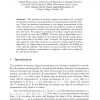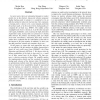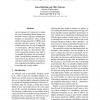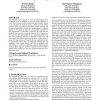176 search results - page 5 / 36 » Sorting and Selection with Random Costs |
CPM
2004
Springer
13 years 11 months ago
2004
Springer
The problem of sorting a signed permutation by reversals is inspired by genome rearrangements in computational molecular biology. Given two genomes represented as two signed permut...
ICDCS
2009
IEEE
13 years 5 months ago
2009
IEEE
In recent years, there are substantial demands to reduce packet loss in the Internet. Among the schemes proposed, finding backup paths in advance is considered to be an effective ...
ICML
1994
IEEE
13 years 11 months ago
1994
IEEE
With the goal of reducing computational costs without sacrificing accuracy, we describe two algorithms to find sets of prototypes for nearest neighbor classification. Here, the te...
EMNLP
2004
13 years 9 months ago
2004
Active learning (AL) promises to reduce the cost of annotating labeled datasets for trainable human language technologies. Contrary to expectations, when creating labeled training...
ESEM
2008
ACM
13 years 9 months ago
2008
ACM
Pair programming is a practice in which two programmers work collaboratively at one computer on the same design, algorithm, or code. Prior research on pair programming has primari...




